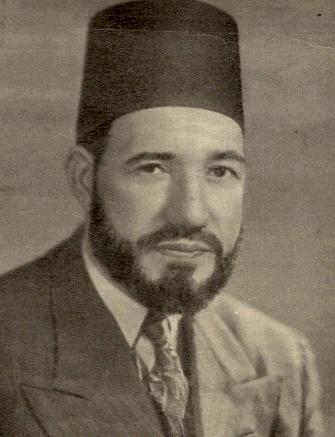Hassan al-Banna
 Hassan Ahmed Abd al-Rahman Muhammed al-Banna (; 14 October 1906 – 12 February 1949), known as Hassan al-Banna (), was an Egyptian schoolteacher and Imam, best known for founding the Muslim Brotherhood, one of the largest and most influential global Islamist movements, and for his death at the hands of the Egyptian government.
Hassan Ahmed Abd al-Rahman Muhammed al-Banna (; 14 October 1906 – 12 February 1949), known as Hassan al-Banna (), was an Egyptian schoolteacher and Imam, best known for founding the Muslim Brotherhood, one of the largest and most influential global Islamist movements, and for his death at the hands of the Egyptian government.Al-Banna's writings marked a turning-point in Islamic intellectual history by presenting a distinct and all-encompassing modern ideology based on Islam. Al-Banna considered Islam to be a comprehensive system of life, with the Quran and Sunnah as the only acceptable constitution. He called for Islamization of the state, the economy, and society. He declared that establishing a just society required development of institutions and progressive taxation, and developed an Islamic fiscal theory where ''zakat'' would be reserved for social expenditure in order to reduce inequality. Al-Banna's ideology featured criticism of Western materialism, British imperialism, and the traditionalism of the Egyptian ''ulema''. He appealed to Egyptian and pan-Arab patriotism but rejected Arab nationalism and regarded all Muslims as members of a single nation-community.
Following the abolition of the Caliphate in 1924, al-Banna called on Muslims to prepare for armed struggle against colonial rule; he warned Muslims against the "widespread belief" that "''jihad'' of the heart" was more important than "''jihad'' of the sword". He allowed the formation of a secret military wing within the Muslim Brotherhood, which took part in the Arab-Israeli conflict. Al-Banna generally encouraged Egyptians to abandon Western customs; and argued that the state should enforce Islamic public morality through censorship and application of ''hudud'' corporal punishment. Nonetheless, his thought was open to Western ideas and some of his writings quote European authors instead of Islamic sources.
Al-Banna was assassinated by the Egyptian secret police in 1949. His son-in-law Said Ramadan emerged as a major leader of the Muslim Brotherhood in the 1950s. Provided by Wikipedia
1


